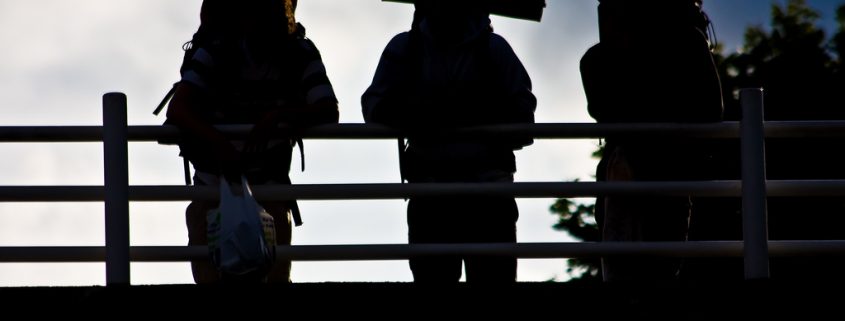Ultralight with Jesus
(Matthew 9:35-10:14) By Rev. Rick King—For our honeymoon in 1997, Linda and I backpacked six miles in on the Kekekabic Trail in the Boundary Waters. We had planned to go further, but found the perfect campsite and decided to make it our base camp for day hikes and hanging out. It was wonderful: simplicity, solitude, and the kind of silence that refreshes your spirit. Apart from two hikers going by once on the trail and a single canoer on Parent Lake, we saw nobody but each other the entire week—perfect for two newlyweds on a long-awaited honeymoon.
For our wedding, the only place we registered for any gifts was at Erehwon Mountain Outfitters, for camping equipment. On the Kek, we took conventional frame backpacks, down sleeping bags and Ensolite pads, a couple backpacking stoves and fuel, clothes and sundries, and a traditional, 2-person tent and ground cloth borrowed from a church member. Plus that delicious, dehydrated food you buy at places like REI.
Both of us are committed to simplicity, and we tried to pack sparingly, but our packs with food, water, and fuel ended up weighing 45-50 pounds each! Now, this would not have been a big deal in ordinary circumstances—both of us were in our early 30s and in really good shape—but for the fact that we lost our way on the opening section of the trail before it goes into the woods, where it’s easier to see the path—and fell off an old beaver dam into the water up to our chests! It was at that moment that the extra pack-weight became apparent!
Since then, Linda, especially, has discovered how packing less for a hike, beyond a couple of energy bars or an apple, and a water bottle, can make the hiking experience less arduous and closer to the land. And if you’re backpacking out west, you still need a way to bear-proof your campsite. But thanks to the advent of what’s called Ultralight Camping and Hiking, the focus is less on things and more on what we get outdoors to do!
Ultralight principles emphasize carrying the lightest and simplest gear safely possible for a given trip. The goal is to cover longer distances per day with less wear and tear on the body, and particularly over the course of a long through-hike like the Appalachian or Pacific Crest Trail, that can make a difference.
In our reading this morning from Matthew, Jesus instructs his disciples to travel light. Ultralight. He’s been preaching, teaching, healing, and casting out demons as a growing crowd follows him throughout the countryside. He now has so much to do that he’s reached the point where he’s calling others to be involved in this work, and he starts with the twelve disciples—essentially, putting an expedition together for a trek through the Galilean wilderness, if you will.
And so, as he sends them out, he not only gives them authority to do what he does and say what he says, he also gives them strict orders about where to go and what to take. And he says, essentially, “Love before luggage. You need to give people the opportunity to receive you and provide for you, because that will tell you if they’re receptive to what you’ve come to offer.” They’re on a mission, and the mission is what dictates what to take and what to leave home.
Ever notice how being preoccupied with an exhaustive packing list is driven by fear of not having something? The same is true of our lives, particularly as people of faith. It’s not that we’re supposed to deprive ourselves of what we need; but a preoccupation with things can close us off to other people, and the value of relationships, which are Jesus’ stock in trade, and therefore ours, as well.
Much of the recent literature on Ultralight camping and hiking is focused on being intentional and strategic in choosing gear. To illustrate the difference in Ultralight’s orientation toward stuff, compare the difference in what’s called “base pack weight”—the weight of the pack, plus the gear it’s carrying, excluding consumables such as food, water and fuel. Traditional backpacks can range anywhere from over 30 pounds to upwards of more than 60; Ultralight packs aim for below 20 to as low as 10 pounds! To do this, Ultralight says do things like the following:
Reduce each item’s weight, weigh everything, carry fewer items.
Share gear with others, swap gear for skills – use well what you have.
Rethink, reduce, repackage to take exactly what you need; no extra.
Pack items that will serve more than one purpose.
Jesus is very specific in telling his disciples what to take and not to take on their journey. Understand what a change this outfitting talk would’ve been for these fishermen, tax collectors, and others who had never had to even think of traveling light, much less do cold-calling on communities where they might be rejected outright, even attacked. But if they’d been weighed down by their luggage, even a quick escape from an inhospitable town would’ve been more difficult.
On our faith journey, we need to travel light, too. You may never hike or do backcountry camping, but you intuitively understand how things get in the way of living life faithfully, rather than making it possible. This is especially true in communities. Traveling “ultralight with Jesus” frees us up to focus on relationships, and sharing, and creativity—and it frees us from the tyranny of money and possessions, restoring right perspective on them as tools that God can use to heal the world and spread the liberating Good News through us.
Today is Pledge Sunday, when we recommit our life and our living, in specific ways, to what God will accomplish in the coming year as we live out our mission as “seekers and servants, growing in God’s transforming love.”
Amen.

